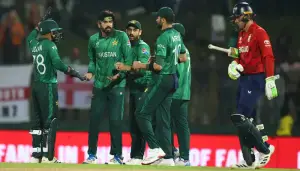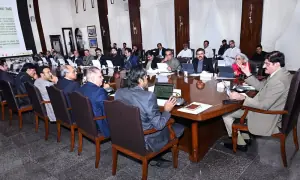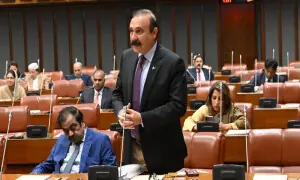Kohistan girl killed on orders of her family, not jirga, says DSP Ahmed
3 min read
DSP Mukhtiar Ahmed has clarified that the 18-year-old girl in Khyber Pakhtunkhwa’s Kohistan was killed on the orders of her family, not any local jirga, as police investigate her death.
“I want to clear that it was not a national or a local jirga. It was their family members like paternal uncle, maternal uncle at home where this incident happened,” he told Spot Light with Munizae Jahangir in an interview which was aired on Aaj News on Monday.
Earlier, it was reported that the girl had been allegedly killed after a local jirga, villager elders, called for her death because she had appeared in a picture on social media. The veracity of the photo is yet to be ascertained, but human rights activists believe such decrees were issued in the past by the jirga.
Police have arrested the victim’s father and registered a complaint which includes the charge of premeditated murder and punishment after the waiver of qisas.
The killing of the girl reminded the people of the 2012 video scandal from the same area where at least four women and five men were killed after they were seen dancing and clapping in a video.
DSP Ahmed, who had joined the show via an audio link, added that the members of the house had been identified and the police teams would hopefully arrest them and other suspects soon.
Human rights activist Tahira Abdullah, who was also on the show, described the incident as a “premeditated murder”. She demanded that the state should become a complainant in the case.
But another human rights activist Farzana Bari lamented that the system was “corrupt” as she highlighted the video scandal case, saying that all convicted suspects in the case were acquitted a few months ago because of “lack of evidence”. She added that one of the suspects was awarded a death sentence.
Bari went on to say that it took seven years for the justice system to punish the culprits and a few months to acquit them.
When asked about how police would ensure that they would be arrested, Ahmed said that the state was the complainant in the case. “The FIR is registered by the SHO. We have added sections 311, 302, 109, and 34 of the Pakistan Penal Code to the complaint.”
He added that there would not be a settlement (raazi nama) on this case as the victim’s mother or sister was not a complainant.
“Now the state is the complainant so we will take it as a base and investigate [the case],” Ahmed said and shunned the possibility that the murderer could be pardoned as the state was the complainant.
But human rights activist Bari mentioned that the murderer in the Qandeel Baloch case was released despite that police were the complainant. “When matters related to women come, the system collapses.”
She claimed that the two boys in the video scandal were still receiving threats.
When asked, the DSP said they were in touch with such boys and they were “not receiving” such threats. He claimed to have provided them with foolproof security.
While speaking about the girl in the photo case, he said the second girl was sent home after she told the court that her life was not in danger. Her marriage was already scheduled, the police officer said.
“We have sent the photos and a letter to the FIA Cyber Crime Cell to investigate how photos were edited, went viral, and from which ID they were uploaded. We will receive reports in two to three days and a case will be registered then,” Ahmed said.
For the latest news, follow us on Twitter @Aaj_Urdu. We are also on Facebook, Instagram and YouTube.























Comments are closed on this story.